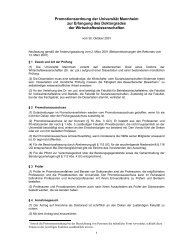Modulkatalog - Abteilung VWL - Universität Mannheim
Modulkatalog - Abteilung VWL - Universität Mannheim
Modulkatalog - Abteilung VWL - Universität Mannheim
Erfolgreiche ePaper selbst erstellen
Machen Sie aus Ihren PDF Publikationen ein blätterbares Flipbook mit unserer einzigartigen Google optimierten e-Paper Software.
Voraussetzungen für die<br />
Vergabe von ECTS-<br />
Punkten und Benotung<br />
Modulverantwortlicher Prof. Dr. Philip Jung<br />
Weitere Lehrende keine<br />
Titel des Moduls Economics of conflict<br />
Art und Verwendbarkeit<br />
des Moduls<br />
Dauer des Moduls 1 Semester<br />
ECTS-Punkte 4<br />
Lehrmethode Blockseminar (2 SWS)<br />
Präsentation (30%), mündliche Beteiligung (10%), Seminararbeit (60%)<br />
Wahlveranstaltung im Bachelorstudiengang Volkswirtschaftslehre; ggf.<br />
Wahlveranstaltung in zahlreichen anderen Bachelorstudiengängen der<br />
<strong>Universität</strong> <strong>Mannheim</strong><br />
Arbeitsaufwand Präsenzzeit Seminar: 21 Stunden, Zeit für die Anfertigung der<br />
Seminararbeit, für die Vorbereitung des Referats sowie für das<br />
Selbststudium: 99 Stunden<br />
Turnus des Angebots einmal jährlich<br />
Zahl der<br />
Teilnehmer/innen<br />
Unterrichtssprache Englisch<br />
Teilnahmevoraussetzungen<br />
Ziele und Inhalte des<br />
Moduls<br />
Erwartete Kompetenzen<br />
nach Abschluss des<br />
Moduls<br />
abhängig von den Wahlentscheidungen im Spezialisierungsbereich,<br />
maximal 14<br />
obligatorisch: Mikroökonomik A und B oder gleichwertig<br />
The module covers topics relating to research on the economics of<br />
contests and conflicts and introduces students to a varied set of relevant<br />
research papers. A broad definition of “conflict” is used, and the term is not<br />
restricted to armed or violent confrontations. The course covers themes<br />
relating to inter-individual conflicts, inter-group conflicts, mutual deterrence,<br />
some reasons for conflicts, the role of preferences and the impact of fear.<br />
Students know basic approaches and concepts in the economics of conflict<br />
and are aware that a wide range of questions is being investigated in this<br />
literature. They understand how conventional theoretical methods in<br />
economics can be used to analyze and better understand conflicts. They<br />
understand relevant theory- and model-based analytical methods. They are<br />
able to apply mathematical, statistical and graphical techniques in an<br />
appropriate manner and to communicate effectively and clearly in written<br />
and oral formats.<br />
67















